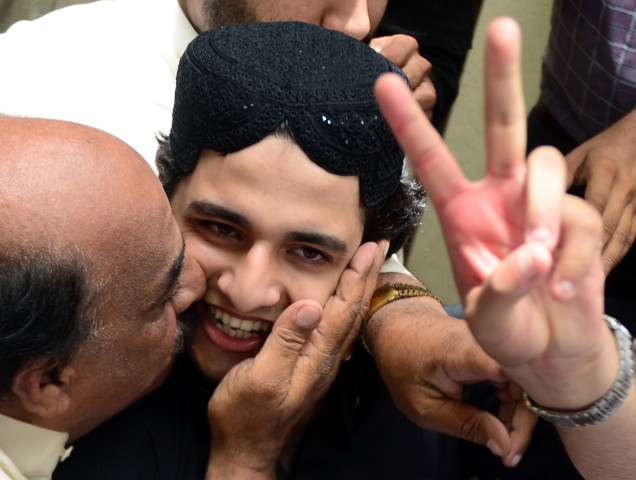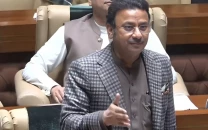Shahzeb murder outcome of 'personal egoistic approach': SC
Top court says provisions of Anti-Terrorism Act not applicable in the case

The Supreme Court has held that the Shahzeb murder case was the outcome of a “personal egoistic approach” and there was “no element of terrorism”.
A 17-page judgment authored by Justice Sayyed Mazahar Ali Akbar Naqvi explained the reasons for acquitting Shahrukh Jatoi, who was convicted for the December 2012 tragic murder of 20-year-old Shahzeb Khan in Karachi, last month.
The judgement said there was no ambiguity left that the case was the outcome of a “personal egoistic approach” and there was no design or purpose of destabilising the government, disturbing the society or hurting a section of the society with a view to achieving objectives which are essentially political, ideological or religious.
Therefore, provisions of the Anti-Terrorism Act (ATA) were not applicable in the case.
Read more: SC acquits Shahrukh Jatoi in 2012 Shahzeb murder case
Headed by Justice Ijazul Ahsan, a three-judge bench comprising Justice Munib Akhtar and Justice Naqvi heard the matter.
The judgment noted that admittedly, in the present case, the incident took place due to an indecent joke with the daughter of the complainant by the appellant Ghulam Murtaza Lashari, who was the cook of the appellant Shahrukh Jatoi, “which aggravated the situation and ultimately resulted into the instant unfortunate incident”.
"If the facts of this case are evaluated on the touchstone of the very scheme of the Anti-Terrorism Act and the dictum laid down by a larger bench comprising of seven members of this court, it becomes crystal clear that there was no element of terrorism in the present case,” it said.
This aspect also lends support from the fact that the father of the deceased, who was himself a police officer, while lodging the crime report admitted that a scuffle took place amongst youth in the country club, which ultimately resulted in the instant unfortunate incident, the SC said.
"It is a matter of great concern and apathy that a young man lost his life as a result of an incident, which was initiated by the servant of the appellant Shahrukh Jatoi and the deceased became a classic example of the egoistic approach, which in all eventualities is drastic and the society cannot accredit the same by any stretch of the imagination.”
The involvement of civil society while agitating the grievances of an individual lends support that the “egocentric attitude is unacceptable leaving far-reaching impression not only for the youth of the day rather for the generations to come”.
Also read: Shahzeb Khan murder: Parents pardon culprits 'in the name of Allah'
All these facts and circumstances, when considered and evaluated conjointly, might imprint an impression otherwise but we are constrained to follow the Constitution and the law on the subject, the detailed judgement said and added that it seems essential to reiterate that the courts adjudicate the matters without being influenced by passions.
"The prime duty of the court is to do justice according to its own conscience. While dealing with the life and liberty of an accused, utmost care and caution are required to be exercised by the courts of law because slight carelessness on their part may deprive an accused person/citizen of his life and may cause irreparable hardship and damage to his family.”
The judgment notes that the basic purpose behind the enactment of the Anti-Terrorism Act, 1997, was to prevent, (i) terrorism, (ii) sectarian violence, and (iii) for speedy trial of heinous offences.
The court also noted that the Anti-Terrorism Act was a special enactment and special enactment needs to be taken in perspective of its own object.
"Any departure from same would be the negation of its object and spirit. A preamble of a statute is an introductory and expressionary statement that explains the very purpose and underlying philosophy behind the enactment."
Regarding the conviction of the appellant Shahrukh Jatoi under Section 13(e) of the Arms Ordinance, the judgment noted that admittedly the crime empties were firstly sent to the forensic science laboratory on 31.12.2012 but subsequently they were taken back on 17.01.2013 and were re-submitted later on along with the alleged recovered pistol from the appellant on 23.01.2013.
It said that the court in a number of cases has held that if the crime empty is sent to the forensic science laboratory after the arrest of the accused or together with the crime weapon, the positive report of the said laboratory loses its evidentiary value.
“Sending the crime empties together with the weapon of offence is not a safe way to sustain the conviction of the accused and it smacks of foul play on the part of the investigating officer simply for the reason that till recovery of weapon, he kept the empties with him for no justifiable reason.”
“In this view of the matter, we set aside the conviction of the appellant Shahrukh Jatoi under Section 13(e) of the Arms Ordinance,” the judgement said.



















COMMENTS
Comments are moderated and generally will be posted if they are on-topic and not abusive.
For more information, please see our Comments FAQ